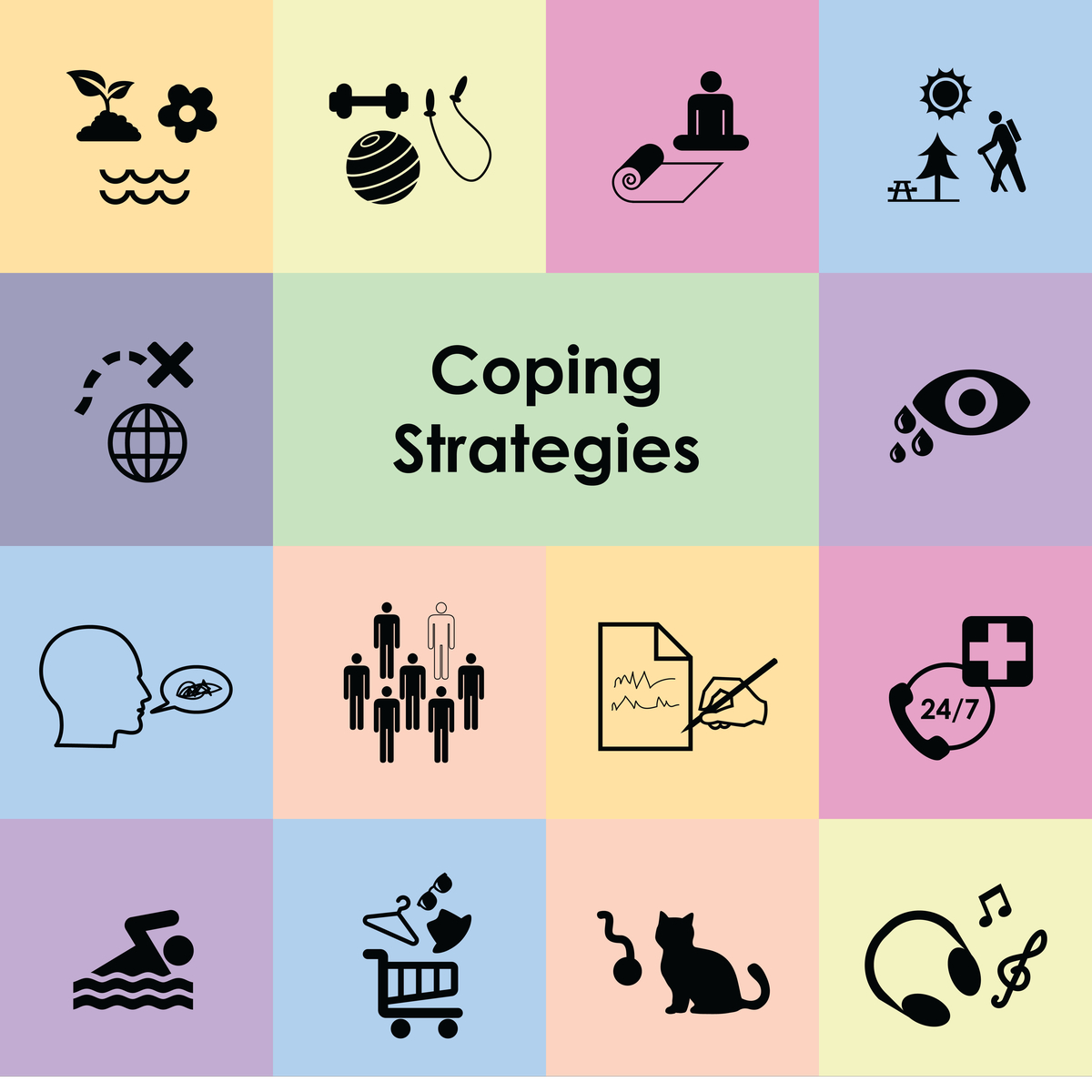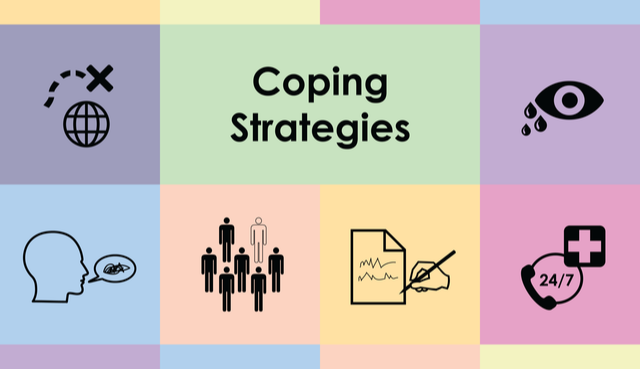The whole world, and Vienna in particular, is currently in a state of crisis. Many of us are currently exposed to multiple burdens in our daily work lives. With this article we would like to counteract the uncertainty and negative news with a positive. We have therefore consulted our expert Marilena Maris for support and asked her what coping strategies we can currently implement.
We are also looking forward to further input on the topic in order to provide as much inspiration as possible.
Sharing is Caring! We are in this together.
Dear Marilena, thank you very much for your helpful video!
In it you discuss the current situation and share tips on how to handle crisis with coping strategies. we are definitely not prepared for these situations. How were the last few hours for you?
Very intense. Since Monday I have been on the phone with many friends, colleagues, customers and business partners, adjusted my schedule and did some pro bono coaching. As a coach I am trained to deal with crisis situations. However, the recent multiple burdens are a challenge for all of us. We are talking about the COVID-19 crisis and its effects in our private and professional lives, about coming to terms with the terrorist attack, about the current lockdown and so on.
How do we take the first step? How can we help and strengthen ourselves at the beginning?
In crisis situations we are confronted with feelings and emotions that are not pleasant, such as fear, panic, shock, paralysis, inability to act. We also quickly notice that people deal with them in very different ways. While some of us have coping strategies at hand or can develop them quickly, others struggle with them for quite some time. So the most important thing is an honest assessment of the situation so that quick help can be guaranteed. I recommend asking these questions:
- How do I really feel?
- What and how do I feel right now?
- Can I continue alone or do I need support?
And it is important to me to emphasise that all feelings are legitimate and not ridiculous. You do not always have to be strong.
How can we detect that I or others are not feeling well?
The emotional side of our brain often recognises more quickly than the logical side that something does not fit, even though we often cannot name the issues. So the famous intuition is helpful. Furthermore, I would look for clues like a strange gut feeling when leaving the house, feeling lonely and uncomfortable, helplessness, lack of concentration, lack of productivity.
Very important: if it’s acute, don’t think about it, act and call the acute help of the City of Vienna immediately. It is better to act too quickly than too slowly.
Should we even talk about it at work?
Especially in the workplace, many people struggle to show weakness. In the current situation it is counterproductive to continue as before and to suppress or even ignore the situation. We are talking about negative consequences, medium to long term, that nobody really needs.
Nobody in Vienna told me yesterday that it was a good working day. Concentration has suffered, for some more than others, and the level of concern is enormous. So why not talk about it openly so that we can get back into everyday life step by step.
I also recommend all managers to talk to the employees. It is better to have a conversation too many than one too few.

Are there certain coping strategies that can be integrated into the daily work routine?
It is difficult to find general advice for individual solutions. However, I like to share some coping strategies and hope that they will inspire you. Basically all healthy strategies are welcome, which strengthen our soul and build up our resilience.
1. talk about it openly, also at work
We should all finally agree that we cannot expect top performance from everyone in these moments. Empathy and compassion are more appropriate, so that we can find our way back into everyday life step by step. And this applies not only in our private lives, but also at work: the sooner we know how our fellow human beings feel, the sooner we can react appropriately. Ultimately, the aim is to deal with difficult emotions such as fear, panic or helplessness in a healthy way by processing them quickly and well.
2. regain the feeling of being capable to act
Many feel a strong sense of despair and powerlessness in these situations because there is little they can do. It has proved to be very helpful to do things that can be influenced immediately. Be it small decisions like a spontaneous break, lunch, a quick alignment. This makes you more capable of acting and you gain a lot. Again, it is not only beneficial but also very valuable to be there for others who have difficulties with the topic.
3. support the brain to cope with negative emotions
Our brain is incredibly adaptable and we can use this to our advantage. Small, positive emotions sometimes already create a healthy balance. In your private life you “treat yourself to something good”, at work you can concentrate on favourite topics or favourite projects and seek contact with those colleagues who are good for you.
My personal tip: a 90 second exercise to trick the amygdala
Intense emotions in violent situations are “taken over” by the amygdala, the side of our brain responsible for primary responses to stimuli. In other words, for classic “Fight – Flight – Freeze” reactions. When things get intense, the amygdala can “overrule” our prefrontal cortex, which is responsible for logic, structure and planning. We are talking about a chemical process in our body that takes about 90 seconds. Several studies have proven that after these 90 seconds we are no longer in a chemical process but in an emotional “endless loop” and we can influence this loop strongly with the power of our thoughts. “Tricking the amygdala” according to Dr. Daniel Goldman:
- Identify emotional reaction
- Naming emotions
- Pause, breathe deeply 10 times (abdominal breathing)
- If possible, let emotions go
- Consciously decide which option for action is appropriate at the moment
4. connected and together, instead of lonely
Many people feel very lonely in the home office and this is currently very counterproductive. In the current situation a lot of creativity is needed. In addition to the now common virtual coffees and activities, one should simply experiment. For example with virtual co-working sessions. As in offline life, people meet virtually and work on different topics in parallel. In the run-up to the meeting, times are agreed upon which are dedicated to exchange or joint breaks. Some of the groups I accompanied found it good to leave the webcams switched on all the time. They simply felt better to actually see people.
5. Smart breaks
A spontaneous LinkedIn survey showed that only 36% of us take a break when they need one. Some 26% even find the lunch break a challenge. So I would strongly recommend that we make the good old break a habit again ? Contrary to the often general opinion that breaks only prolong work, it has been scientifically proven several times that breaks increase productivity. Breaks are productive!
By the way: High performers in all disciplines skilfully use breaks to be more balanced and productive. Shorter, but more frequent breaks are highly recommended.
6. pay conscious attention to language, rhetoric and media consumption
Ludwig Wittgenstein said: “Language creates reality” and that is true. Both the inner dialogue and the conversations with others can influence us very strongly in processing and finding solutions. In addition, the medially staged article reinforces or re-triggers the negative feelings that we actually want to process.
It is also recommended not to watch videos of current tragedies, especially if you have a personal connection to Vienna. If you know the places well, you can identify too strongly with them and unintentionally become part of the events.
7. good old basics
- Take care of your own health
- Stay in motion
- Balanced diet
- Drink plenty of water
- Maintain good rituals
- Spend time with the right people
These are aspects that always help, not only now!

Marilena Maris
Business economist, personnel developer and executive coach

